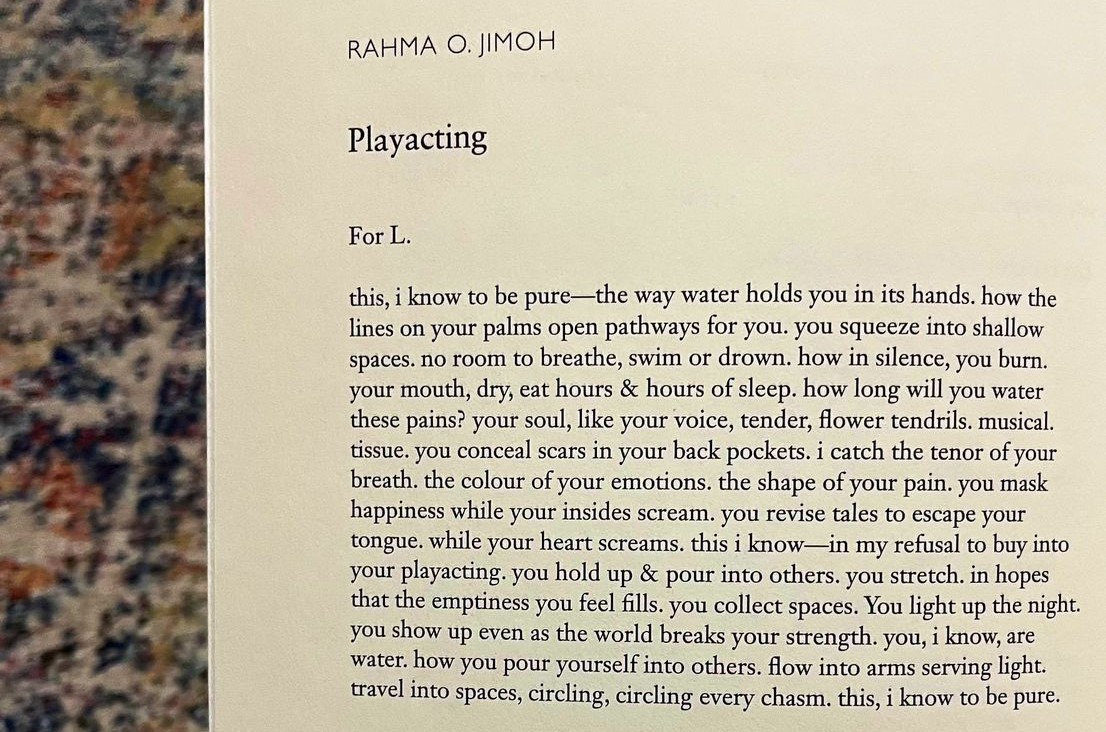Friday Poetry: Review of Rahma Jimoh’s Playacting
By Saheed Sunday
Contemporary Nigerian poetry has found a remarkable voice in Rahma Jimoh. Her poetry resonates strongly within the literary sphere, showcasing a depth that goes beyond simplicity. One of the critical lessons her work imparts is the distinction between accessibility and simplicity. While her poems may not adhere to simplicity, they remain highly accessible, attracting readers with their resonating themes and relatable narratives. An exemplary case is her poem "Playacting," published in Salt Hill Journal, which illustrates this synergy of accessibility and complexity.
Rahma's poetry exhibits a fascinating interconnection with other renowned poems. For instance, reading "Playacting" led me to reminisce about Niyi Osundare's "Chicken Story." Despite both poems delving into the theme of deceit, their focus differs significantly. Osundare's deceit is political, while Rahma's is deeply individual. In "Playacting," the narrative unveils an individual, labeled as "L," who deceives herself with a facade of happiness, creating an intricate web of emotions.
Exploring "Playacting": The poem commences with a vivid description of the relationship between the poet's persona and "L." The imagery paints a picture of confinement and discomfort, where "L" is trapped in metaphorical shallow spaces, struggling for breath. This deliberate choice of words emphasizes the dire situation. However, a paradox surfaces—why does someone in such a perilous position "burn" in "silence"? This contradiction prompts readers to question whether "L" derives some strange satisfaction from her predicament.
Rahma unveils "L's" complexity through rhetorical questions like "how long will you water these pains?" These inquiries invite readers to ponder the duration of her silent suffering. The poet's intimate understanding of "L's" concealed scars and suppressed pain reinforces the closeness between them. The persona perceives the act being played out, where "L" conceals her pain behind a facade of happiness that contradicts her inner turmoil.
The poem's pinnacle arrives with the acknowledgment of "L's" unyielding resilience in the face of adversity. "L" symbolically "lights up" the night, signifying her ability to maintain a smile despite sadness. Even as the world threatens her strength, she persists. The persona recognizes that while "L's" illusion of happiness might be deceptive, her unbreakable spirit remains genuine.
Rahma Jimoh's "Playacting" captures the intricate dance between accessibility and complexity. Her poetry embodies a harmonious blend, presenting themes that are accessible yet deeply layered. Through a vivid narrative, Rahma exposes the facade of self-deceit, ultimately celebrating the unwavering resilience within her subjects. This masterful balance elevates her work, leaving readers captivated by the interplay of emotions and ideas.
Saheed Sunday, NGP V, is a Nigerian poet, a Star Prize awardee, a Best of the Net nominee, and a HCAF member. He is the author of a poetry collection: Rewrite The Stars. He won the ZODML Poetry Prize; he was shortlisted for the Rachel Wetzsteon Chapbook Award, Wingless Dreamer Poetry Prize and The Breakbread Literacy Project.





